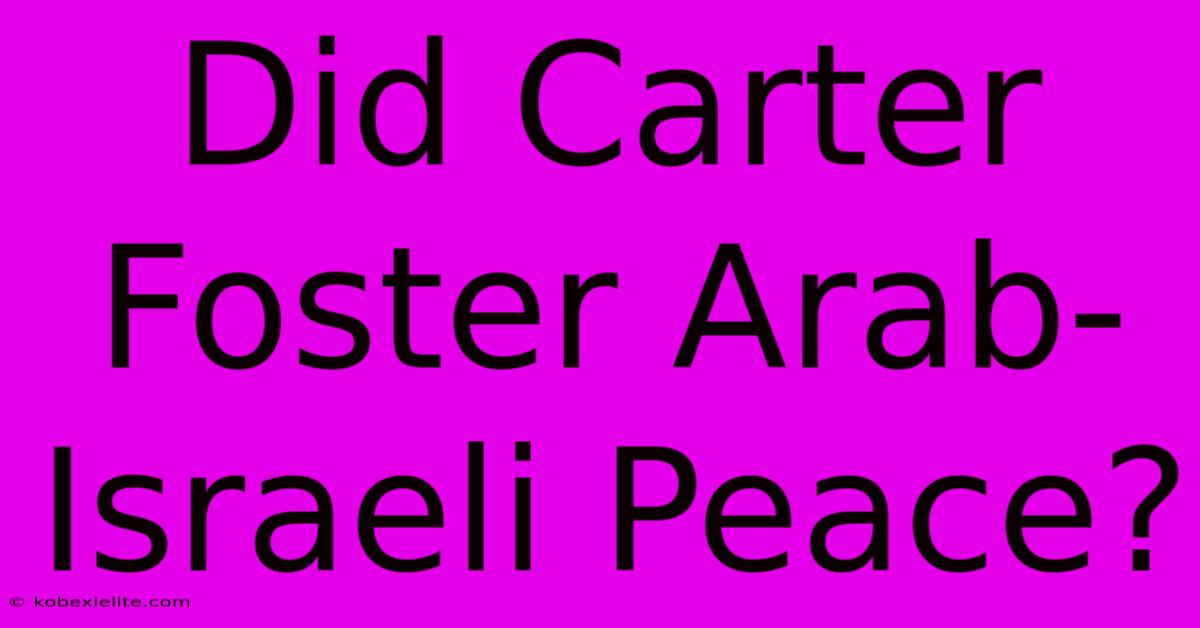Did Carter Foster Arab-Israeli Peace?

Discover more detailed and exciting information on our website. Click the link below to start your adventure: Visit Best Website mr.cleine.com. Don't miss out!
Table of Contents
Did Carter Foster Arab-Israeli Peace? A Complex Legacy
Jimmy Carter's presidency (1977-1981) is often associated with a significant push towards Arab-Israeli peace, culminating in the Camp David Accords. While he didn't achieve a comprehensive resolution to the conflict, his efforts undeniably shaped the landscape of Middle Eastern politics and left a complex and debated legacy. Did he foster peace? The answer, as we'll explore, is nuanced.
The Camp David Accords: A Landmark Achievement?
The most significant event of Carter's involvement in the Arab-Israeli conflict was undoubtedly the Camp David Accords of 1978. This landmark agreement, brokered through intense negotiations at Camp David, saw Egypt, under President Anwar Sadat, and Israel, under Prime Minister Menachem Begin, agree to a framework for peace. This involved Israel's withdrawal from the Sinai Peninsula and the establishment of normal diplomatic relations between Egypt and Israel.
The Accords' Impact: The Camp David Accords were a groundbreaking achievement. For the first time, an Arab nation formally recognized the State of Israel, a pivotal step towards regional stability. Egypt's willingness to engage in direct negotiations with Israel was unprecedented and signified a major shift in Arab politics. The agreement also brought a degree of normalcy to the previously hostile relationship between these two nations, including opening borders and fostering trade and cultural exchange.
Limitations and Criticisms: A Partial Peace
Despite its successes, the Camp David Accords were far from a complete solution to the Arab-Israeli conflict. Several crucial issues remained unresolved:
- The Palestinian Question: The accords largely ignored the plight of the Palestinians, a major source of conflict in the region. This omission drew considerable criticism, as it left the core issue of Palestinian self-determination unaddressed. Many argued that lasting peace could not be achieved without addressing the Palestinian concerns.
- Regional Instability: While Egypt and Israel achieved peace, tensions persisted between Israel and other Arab nations. The conflict in Lebanon and the ongoing Israeli-Palestinian conflict demonstrated that the Camp David Accords were not a panacea for regional instability.
- Long-Term Sustainability: Some argue that the very nature of the accords, focused on a bilateral agreement between Egypt and Israel, failed to build a broader regional consensus, potentially hindering long-term sustainability.
Carter's Role: More Than Just Camp David
Carter's contribution to Arab-Israeli peace extended beyond the Camp David Accords. His administration actively engaged in diplomatic efforts, aiming to promote dialogue and confidence-building measures between the involved parties. His commitment to human rights also influenced his approach, pushing for a just and equitable solution for all involved, including the Palestinians.
A Lasting Impact, but Incomplete Success
To answer the question directly: did Carter foster Arab-Israeli peace? The answer is a qualified yes. His relentless diplomatic efforts, culminating in the Camp David Accords, were a significant step towards resolving a long-standing conflict. However, the limitations of the Accords, particularly the lack of attention to the Palestinian issue and the ongoing regional instability, demonstrate that his efforts were only a part of a much larger and more complex process. While he undoubtedly left a mark on the history of the Arab-Israeli conflict, his legacy remains a subject of ongoing debate and analysis.
Keywords: Jimmy Carter, Camp David Accords, Arab-Israeli conflict, Middle East peace, Anwar Sadat, Menachem Begin, Palestinian issue, Egyptian-Israeli peace, regional stability, diplomatic efforts, legacy of Carter.

Thank you for visiting our website wich cover about Did Carter Foster Arab-Israeli Peace?. We hope the information provided has been useful to you. Feel free to contact us if you have any questions or need further assistance. See you next time and dont miss to bookmark.
Featured Posts
-
Tottenham Vs Wolves Final Score And Report
Dec 30, 2024
-
Mc Kees First Nfl Pass Big Doms Catch
Dec 30, 2024
-
India Loss Rohits Mental Health
Dec 30, 2024
-
1 1 Draw Sheffield United Vs West Brom Report
Dec 30, 2024
-
Understanding Barcelonas Departure From Original
Dec 30, 2024
